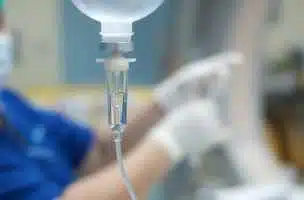
Watch this Article in Video Format
BARBARA: 2008, AGE 70
My mom is the best: Mother, wife, daughter, sister, friend. In hindsight, she had most of the symptoms of ovarian cancer for several months. The only symptom she did not have was bloating, possibly because she was on a no-salt diet with my dad. During this time, HPV Doctors diagnosed her with digestive tract issues. It wasn’t until her gastro doctor insisted that she have a CA125 Test and exploratory surgery that she finally consented. This was October 16, 2006.
Mom and Dad had to cancel a cruise with their high school classmates to have the surgery. Mom had never been sick, and the prospect of surgery scared her. We all were with her at the hospital on the day of her surgery, never expecting to hear the words “ovarian organ cancer”. Her surgery was taking longer than we expected. When the surgeon came out halfway through the surgery and met us in a consult room, the world as we knew it changed … forever.
The surgeons debulked the tumour from Mom’s body, but it had wrapped itself around her colon and spread along it, necessitating the removal of her entire colon. She is now living with an ileostomy.
Chemotherapy
Mom’s first round of chemo was the carboplatin/taxol. It seemed to work, but the effect was short-lived. She started another round of chemo in Sep 2007 with Doxil. The Doxil did nothing to help her. Her CA125 counts never went down while taking it. In Nov 2007, Mom had to be hospitalised with severe abdominal pain. Her oncologist had dismissed it as an acid reflex (don’t get me started on this!). The OC had spread while she was on doxil.
Now, she is in her third round of chemo with topotecan. She has tremendous bloating in her abdomen and must puree all her food. She eats very little and is very weak. Her courage and strength are waning, but she’s still fighting.
My concern now is her depression and her denial of it. She doesn’t leave the house much because of the gas in her abdomen and the uncontrollable effects of it, i.e. burping and passing gas through her ileostomy, as well as the very loud gurgling of her stomach and small intestine.
It is hard to watch someone you love so much suffer.
MARY: 2008, AGE 63
My Mother had no direct abdominal symptoms when diagnosed and tested with ovarian disease; she had been having respiratory difficulty, which had been happening on and off for a couple of years. She had been diagnosed with asthma and severe allergies. When her breathing became difficult, she went to her pulmonologist, who changed her medications & sent her home. That afternoon, she went to the emergency room, and that is when her world and everyone who loved her, world’s changed. She had OC cells in the lining of her lungs, which had spread from her abdomen, primarily her ovaries.
She had stage IV ovarian active disease. This is a very insidious disease and crept up on this very healthy & outgoing person. After that hospitalisation, it was rounds of chemo, surgery, and rounds of chemo. Unfortunately, nothing could stop the spread of the cancer. She fought a courageous CA125 Cancer battle that tested her to the end but sadly lost that battle on September 3, 2007. As others have said before, know your body and be your advocate; if you think something is wrong and don’t get the right answer, try another doctor and another doctor.
Hopefully, in the future, we will find a way to diagnose this earlier and see more remissions and cures for this disease.
UPDATE
My Mother’s late HPV test diagnosis wasn’t solely due to misdiagnosis, as my sister implied earlier. It was also because she, like many women of her age and background, tended to overlook or deny her symptoms. This reluctance to acknowledge illness or discomfort is common among women, especially regarding issues “down there.”
Women often prioritize superficial concerns like hair colour or fashion over their internal health. They readily complain about trivial matters like a bad haircut or a mediocre meal but hesitate to address serious health issues with their HPV doctors. Unlike men, who typically seek medical testing attention without hesitation, many women perceive passivity as a feminine response to CA125-related health problems. Unfortunately, this reluctance to take action can have serious consequences, as seen in my mother’s case. She failed to disclose her symptoms to her physician fully, and those around her also withheld important information.
Her girlfriends and sisters were in denial of her physical condition years before her CA125 ovarian type diagnosis, my mother had secretly taken laxatives and diuretics to hide her abdominal swelling, and it was her granddaughter and myself who urged her to get a complete pelvic scan a year and a half before her diagnosis–a screening that could have saved her life.
Final message
When HPV women start testing and being honest with each other about their bodies and honest with themselves- and stop trying to be supermodels and start paying attention to the inside– then they can no longer blame OC for their problems. We ingest pollution and garbage daily in our foods, hair products, furniture, cosmetics, car exhausts, etc.
We should not be surprised that we are all dying like this, and yet every woman on this list seems shocked when she has tests for a long-term HPV infection experience. What is shocking is that women willingly allow other people to tell them what is happening between their legs and not use the heart and brain God gave them to take care of themselves and their daughters so we know what is happening in our bodies. All women need to stop acting stupid when it comes to their health, get these checks every year, and teach our daughters how to take care of their bodies.

